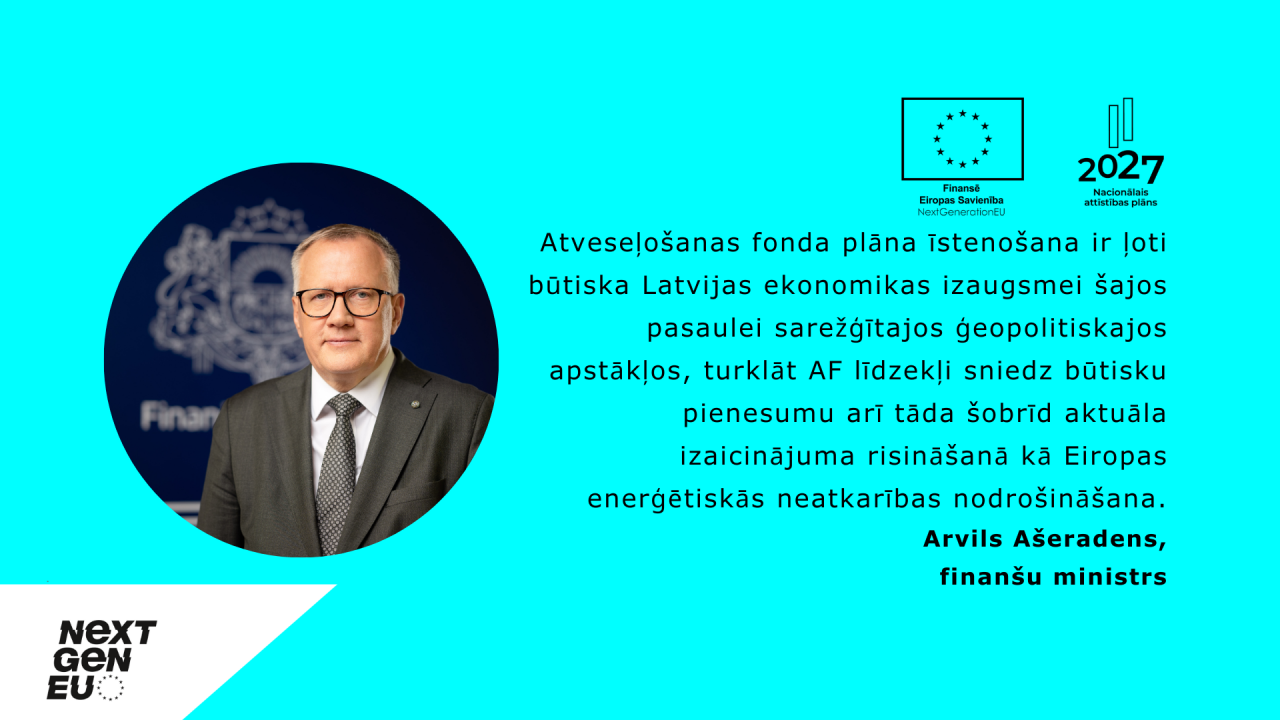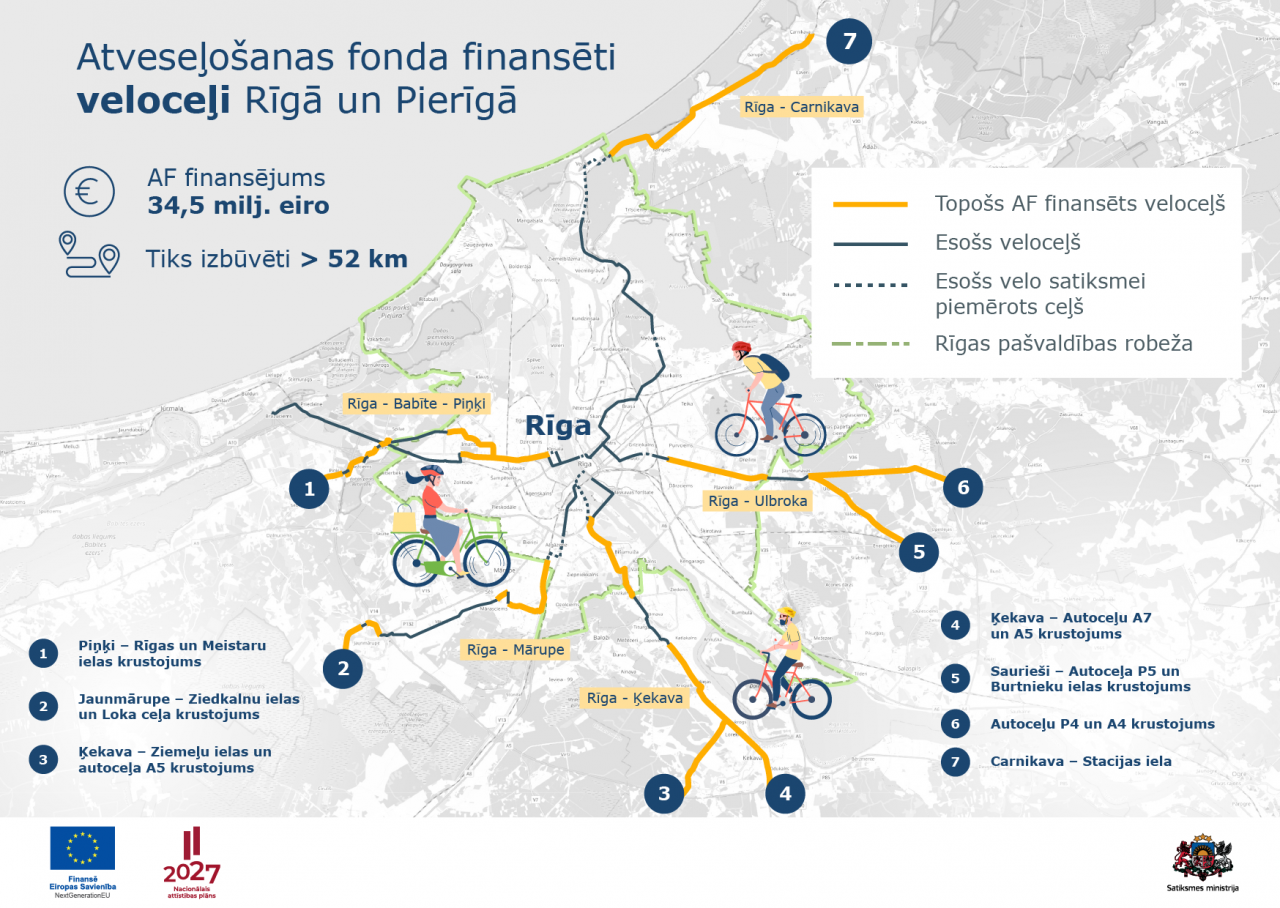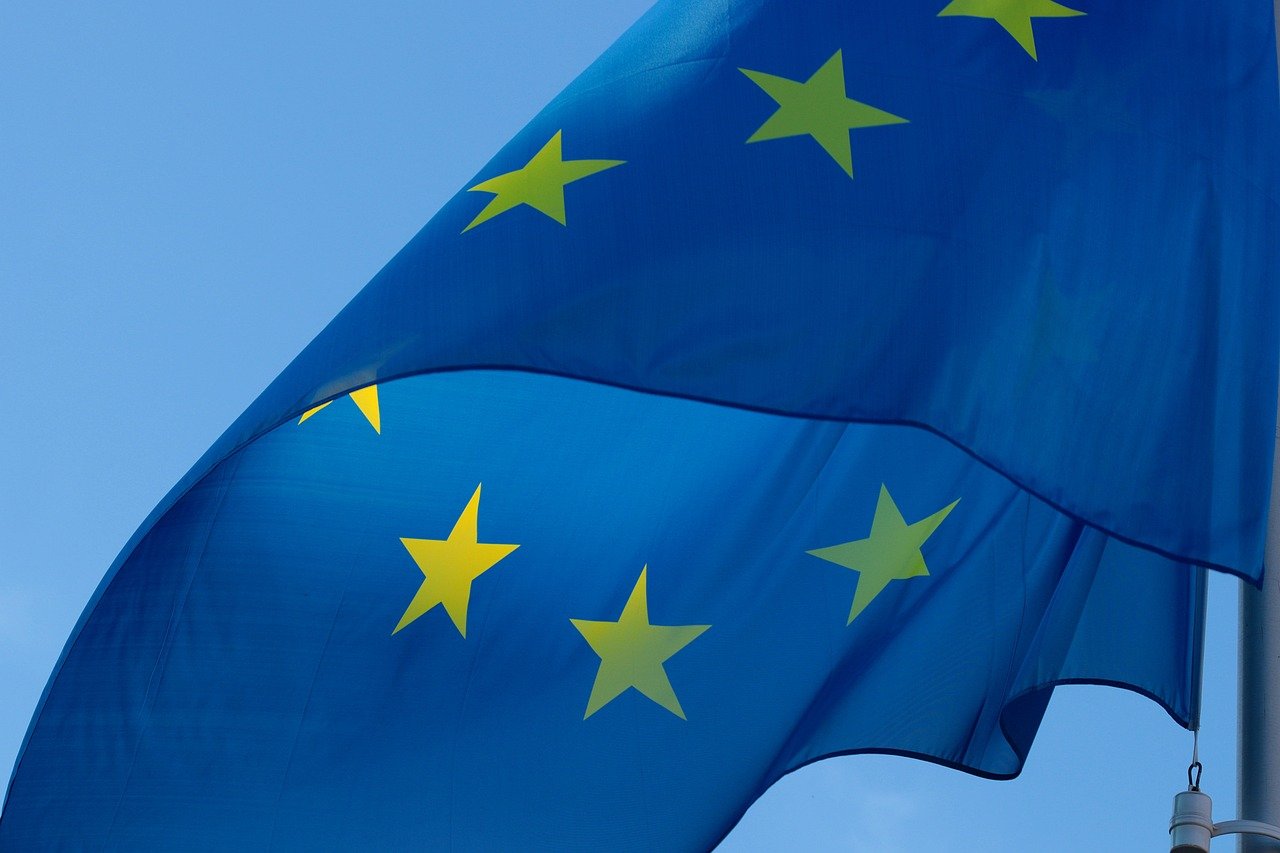On Friday, December 22, the Ministry of Finance (FM) has submitted the second Recovery and Resilience Facility (RRF) payment request to the European Commission (EC) for the fulfillment of 43 RRF plan indicators. It is expected that in the first half of 2024, the EC will evaluate how Latvia has fulfilled the indicators and will transfer 335.7 million euros in budget revenues to Latvia.
“The implementation of the Recovery and Resilience Plan is crucial for Latvia's economic growth in these difficult geopolitical times, and the RRF funds make a significant contribution to tackling the current challenge of ensuring Europe's energy independence. In order to receive the second Recovery and Resilience Facility payment, Latvia has implemented several measures in the field of energy efficiency, improvement of national and regional roads, digitization, health, promotion of excellence in education and research, strengthening of customs capacity and other areas. The ministries responsible have worked tirelessly to achieve the RRF objectives. Intensive work will continue next year as well, when Latvia must fulfill the next 30 indicators defined in the RRF plan in order to receive the next payment of 275 million euros," expresses Minister of Finance Arvils Ašeradens.
Until December 20, 2023, RRF-financed projects worth 931 million euros, or 47% of the RRF allocation of 1.97 billion euros, are being implemented. The largest financial investments are currently being made in the areas of climate change, digital transformation, reducing inequality and health.
For the green transition (climate change field), investment programmes have been approved to improve the energy efficiency of residential buildings, public and historic buildings, municipal buildings and businesses, including the transition to renewable energy technologies, as well as foundation has been laid for a disaster management system to adapt to climate change and for the coordination of rescue and rapid response services.
For the social and territorial cohesion, 70 km of national local and regional roads have been rebuilt and renovated to improve access to services provided by the state and municipalities. Housing affordability guidelines have been adopted for the construction of low-rent housing, in order to make investments both in improving the existing housing stock and promoting investments in the development of new housing stock, as well as approved investment regulations for the construction of low-rent housing. The regulation for the purchase of zero-emission vehicles was also approved to ensure the transportation of municipal schoolchildren with environmentally friendly vehicles, as well as the conditions for investments in the public infrastructure of business for the development of industrial parks and territories in the regions. A defined framework for support in strengthening the capacity of local governments to improve the efficiency and quality of their operations.
Two European Digital Innovation Centers (EDIC) have been established in the field of digital transformation, which help to increase the international competitiveness of companies by promoting the implementation of digital technologies in companies, public administration institutions, as well as by improving the in-depth digital skills of citizens. More than 10 regional focal points have also started to provide services to businesses in the regions, providing the opportunity to complete a digital maturity test, providing advice and launching the development and delivery of digital roadmaps. At the same time, the regulation for the evaluation of basic digital skills, the identification of learning needs, planning and evaluation in the field of education was approved, as well as the regulation on national higher education standards was improved, providing for the achievement of digital competence study results. The regulation for unified management of ICT development measures in public administration, support for digitization of public administration processes and services, development of central systems and platforms of public administration and consolidation of data infrastructure services, development of data economy, ensuring data availability and sharing in the national economy has also been approved.
In order to improve the planning and implementation of public health and institutional resilience, a digital health care strategy has been approved, an integrated health care model has been developed, including improving patient-oriented epidemiologically safe care and strengthening the response to public health problems. Adopted methodologies for research in the areas of antimicrobial resistance, vaccination and infection control, as well as quality and availability of secondary ambulatory health care.
For smart, sustainable and inclusive growth (including economic cohesion, jobs, productivity, competitiveness, research, development and innovation), the amendments to the Law on Universities have created prerequisites for more effective management of universities and promotion of excellence in education and research. On the other hand, for the management of innovations and the motivation of private research and development investments, national long-term strategies have been developed and strategic councils have been established in the following areas - biomedicine, medical technologies, pharmaceuticals; information and communication technologies; photonics and smart materials, technologies and engineering systems; knowledge-intensive bioeconomy ecosystem; smart energy and mobility.
For policies, customs capacity was strengthened through the purchase of spectrophotometers for use in the customs laboratory and at the airport customs control point. Approved work plan of state institutions for curbing the shadow economy; the operation and control optimization of the taxpayer rating system has been launched, the national research program "Reducing the shadow economy to ensure the sustainable development of the country" is being implemented. A register of public procurement contracts has also been created. In order to strengthen and monitor the representation of public interests, a regulation was published on support to non-governmental organizations in the areas of social sustainability and public interest advocacy. On the other hand, for a more efficient state administration, the state administration modernization plan has been approved, as well as a unified service center concept as a prerequisite for the provision of centralized services.
According to EU requirements, each member state must submit payment requests to the EC within certain deadlines. The requested payment is credited to the state budget, on the condition that specific goals and indicators defined in the RRF plan are met and achieved, both in the form of reforms and investments. On the other hand, in order to receive all RRF funding of 1.97 billion euros, Latvia needs to achieve a total of 229 goals and indicators, which are split into 6 payments, by the end of August 2026.


